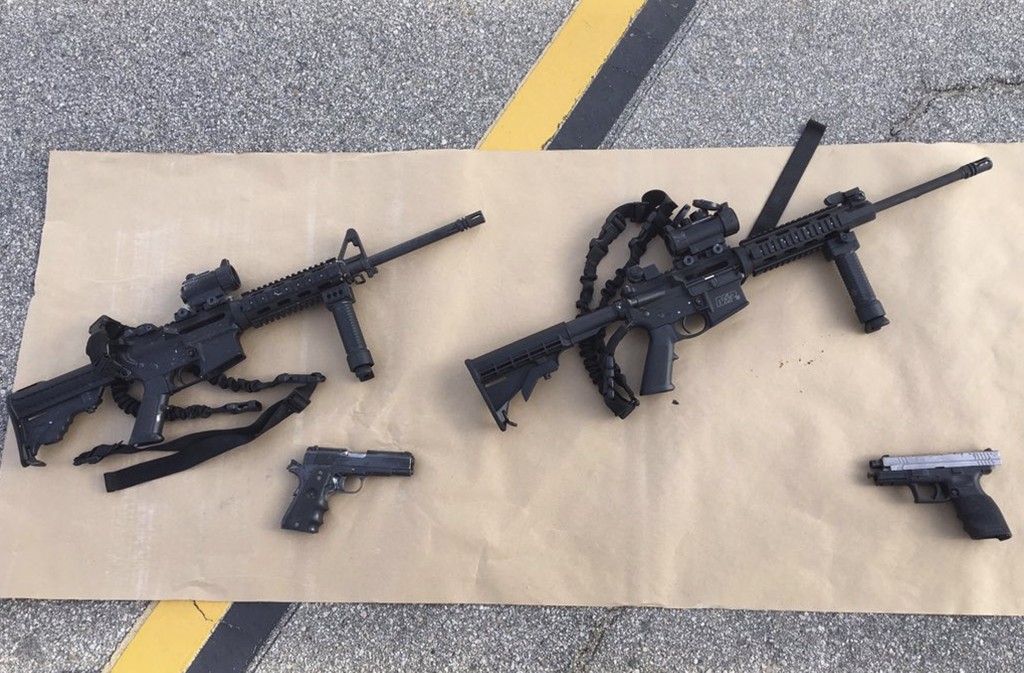
Weapons confiscated from last Wednesday’s attack in San Bernardino, California are shown in this San Bernardino County Sheriff Department handout photo from their Twitter account.
In the United States, every day is becoming a black day, as mass shootings escalate out of control
Last week, like millions of others, I was logged onto Amazon, trolling through the shopping behemoth’s website, looking at the deals on offer as part of Black Friday.
I’m not really sure where this buying binge/exercise to shift old stock came from but everyone likes a bargain and nowadays, Black Friday is big business — in the UK, shoppers splashed £1.1 billion over the 24 hours, while in the US an estimated US$12.1 billion was spent.
It’s easy to see the attraction. On Friday, items cost less than they did before — what’s not to like? When a cuddly Yoda doll is reduced by 10 bucks and the clock is tick-tocking down in corner upping the pressure, who wouldn’t click ‘Add to basket’?
And behind those record, big billion numbers lie a billion little stories. New parents buying bits for babies. Parents purchasing birthday presents. Teens buying things they wouldn’t dare by in a shop. Grandparents and Mondeo men buying Adele CDs.
One such story caught my eye earlier on in the week. As frantic shoppers in the United States filled up their online baskets and ran through physical stores pushing over competing shoppers, the FBI was busy breaking its own record — background checks for firearms.
The agency revealed this week that it processed 185,345 background checks over Black Friday’s 24 hours, up five percent from the year before. That’s roughly two a second.
While that figure doesn’t only mean new guns exclusively (checks are run for purchases and for permits), it’s pretty shocking. And it should give us a very timely pause for thought.
Last week’s Black Friday was black for another reason too. It was the same day that three people died in Colorado, after a gunman walked into a Planned Parenthood office and started shooting with extreme prejudice.
This is happening far too often in the United States. And in the hours since I began writing this column, the country has suffered another mass shooting, this time in San Bernardino, east of Los Angeles. According to a tally put together by The Washington Post, it was the 355th mass shooting (involving four or more victims) of the year.
The FBI revealed this week that it processed 185,345 background checks over Black Friday’s 24 hours, up five percent from the year before. That’s roughly two a second.
This time, a married couple — who built up a veritable arsenal of weapons and ammunition — unleashed hell on the innocent, killing 14 and wounding many others. The Republican right will seize on what now looks like a terrorist incident, reducing the incident to a battle between the “good guys” and the “bad guys” but for me that focus in short-sighted.
As if the story could get any more concerning, police believe the weapons were all acquired legally.
Cold dead hands
The New York Times’ Nicholas Kristof wrote earlier this year that “more Americans have died from guns in the United States since 1968 than on battlefields of all the wars in American history.”
Today, the United States has the highest level of ownership in the world — a shocking 88.8 guns per 100 people, according to a study by the Small Arms Survey. The Post estimates there are 270 million guns in civilian hands in the US in total. To that, we could add the untold quantities of weapons in military hands.
Clearly, this should raise some alarm bells. There is a problem — mass shootings are on the rise — and the strongly-worded speeches from Barack Obama that follow such tragedies and the repeated “hopes and prayers” of Republican presidential candidates do nothing to solve it.
The usual argument against gun control involves the Second Amendment, the right to bear arms adopted in 1791. But the US Constitution is not sacrosanct, it has been altered. The people that founded it, no matter in how much regard they are held, were not all-seeing visionaries of the future. Besides, since 1787, things have moved on a bit — we’ve learnt about evolution, for one. Societies change, they reflect the times, and governments and citizens’ rights for that matter should do so too.
The usual argument against gun control involves the Second Amendment, the right to bear arms adopted in 1791. But the US Constitution is not sacrosanct, it has been altered.
Another counter to gun control is that the weapons don’t kill people, people do. That’s true. But lowering the number of lethal weapons on the street and more importantly, access to them in the first place, would give people less opportunity to commit such crimes. Governments form laws every day to regulate things dangerous to public health and gun crime, it’s fair to say, is dangerous to public health.
Charlton Heston once famously said at a NRA convention that a government could take away his gun when they pried it from his “cold, dead hands.” Perhaps it’s time for the lawmakers in the Washington think about some other cold, dead hands — those of the people who were killed in San Bernardino, Colorado, Sandy Hook, Columbine and beyond.
@URLgoeshere
An edited version of this column was published in the Buenos Aires Herald, on Sunday, December 6, 2015 as part of the ‘Perspectives’ series.
Link: http://www.buenosairesherald.com/article/204459/black-monday-black-tuesday-
